HVAC Companies Sapcote
Top 10 Heating and Cooling Services in Sapcote
Receive multiple HVAC Contractor quotes for your project today! Compare profiles, reviews, accreditations, portfolio, etc... and choose the best service.

Boiler Care Gas
4.524 reviews53 John Street, Hinckley, LE10 1UX, GBWelcome to Boiler Care, the affordable alternative to British Gas. Boiler Care Hinckley is a family run business that has operated in the Hinckley and Leicestershire area for over 35 years. We have a team of qualified engineers to carry out your requirements for boiler care, Central Heating installations, central heating repairs and all gas appliance installations and maintenance. We repair, service and maintain most gas equipment and have a gas appliance showroom for you to visit during opening hours. For an all round heating repairs and heating installation service we have the skilled and qualified heating engineers to assist you.
- Services
- Why Us?
- Accreditations
- Our Team
- Testimonials
- Gallery
Get Quote
GasCare Services
4.857 reviews49 High Street, Barwell, LE9 8DS, GBEstablished for 35 years, GasCare Services are a family-run business based in Barwell, Leicester. We are a team of highly skilled plumbers and GasSafe, Oftec & F-Gas registered engineers carrying out installs & servicing. If you are looking for a boiler repair or service in Leicester, then look no further than Gas Care Services. We understand how frustrating it can be when you need your boiler to be working at its best, which is why we have been repairing and servicing boilers to the highest standards for over 35 years. So if your water is not warming as it should, and your central heating is not working, then your boiler needs to be looked at – and this is where we excel. Our team of specialists is ready and waiting to help you get your boiler repaired. Central Heating Servicing & Installations If you are simply looking for a boiler servicing option in Leicester, then again we are at hand and will provide you with a quality service, no matter which type of boiler you have. There is an old adage that says it is better to prevent than it is to cure, and this is very valid when it comes to the maintenance of your boiler. The last thing you want is to react to a situation when your boiler goes on the blink and leaves you without warm water and central heating. You can simply avoid this by making sure you service your boiler regularly. And this is what we at Gas Care are renowned for. We will make sure that your boiler is thoroughly serviced, minimizing any potential dangers that may arise. For the best and most thorough boiler service in Leicester, call us today on 01455 848 491. Bathroom Installations We offer full-bathroom suite renovations and installations. We can provide updates to your existing bathroom or fit a new room from scratch. We will repair broken plaster, electrics, plumbing and tiling until the entire room is complete. We have a collection of baths, showers, sinks and bathroom furniture. Get in touch for more details
- Services
- Why Us?
- Accreditations
- Gallery
Get Quote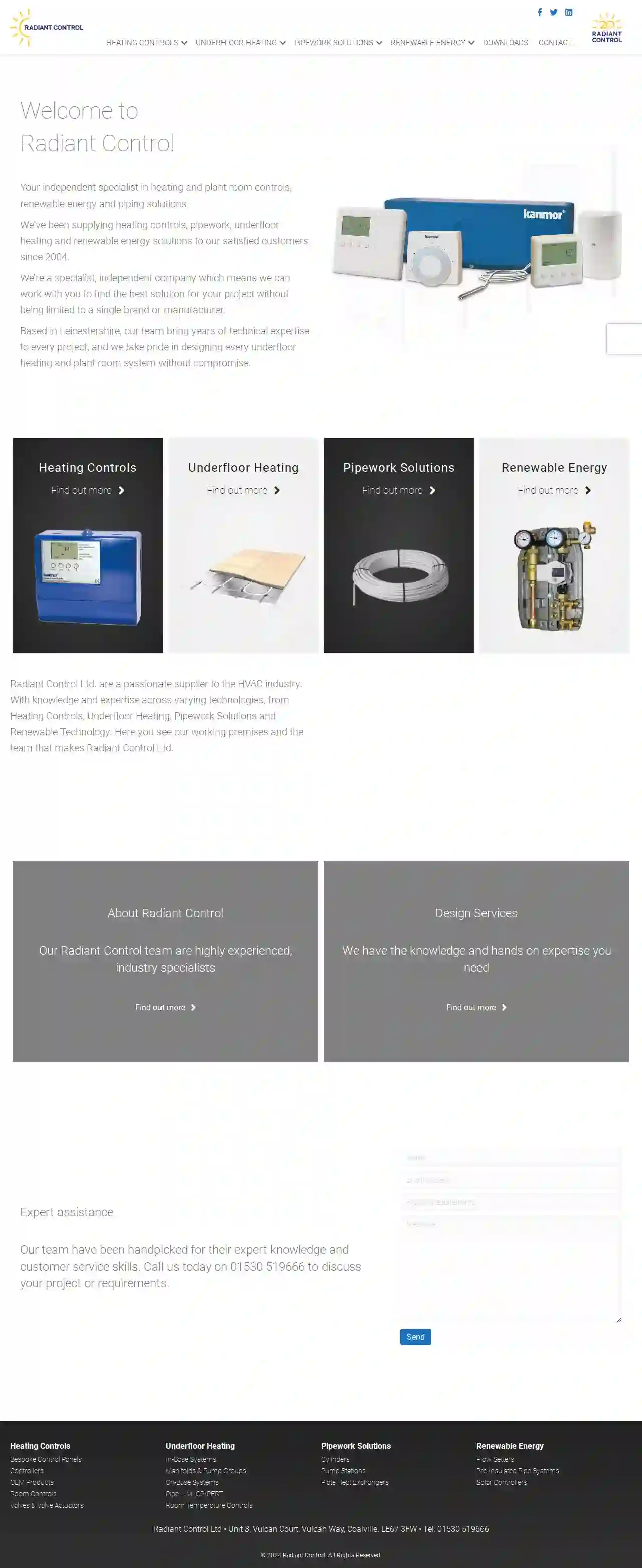
Radiant Control Ltd
516 reviewsVulcan Way, Unit 3, Vulcan Court, Coalville, LE67 3FW, GBRadiant Control is your independent specialist in heating and plant room controls, renewable energy and piping solutions. We’ve been supplying heating controls, pipework, underfloor heating and renewable energy solutions to our satisfied customers since 2004. We’re a specialist, independent company which means we can work with you to find the best solution for your project without being limited to a single brand or manufacturer. Based in Leicestershire, our team bring years of technical expertise to every project, and we take pride in designing every underfloor heating and plant room system without compromise.
- Services
- Why Us?
- Gallery
Get Quote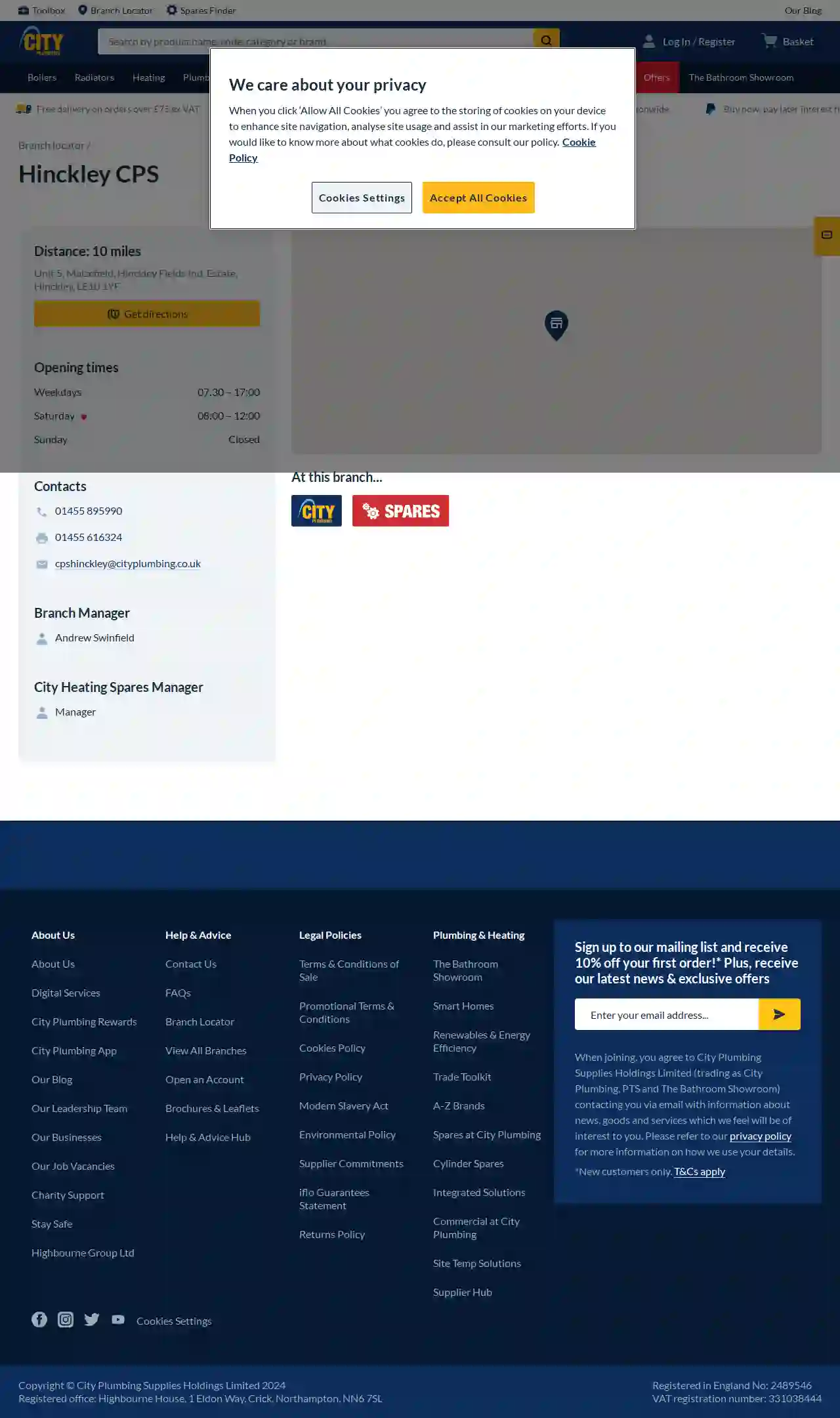
City Plumbing
32 reviewsunit 5, maizefield, hinckley fields ind. estate, hinckley, Hinckley, LE10 1YF, GBCity Plumbing are your trusted plumbing and heating suppliers for the trade. Whether you’re fitting a new boiler, radiator or full bathroom suite, we’ve got all the tools you need to get the job done. From electricals to plumbers’ supplies and much, much more – we stock all the top brands at affordable trade prices. When you’re on a job, time is money. That’s why we stock a wide range of essential products. From copper tubing to towel rails, we’ll make sure you get the plumbing supplies you need within a day or so. As award-winning plumbers’ merchants and specialist distributors, we’ve got over 350 branches across the UK and have been serving our loyal customers for over 40 years. As such, we offer next-day delivery and click & collect options to suit you – because nobody likes to be kept waiting. For the best quality plumbing supplies from reputable manufacturers, find your local branch or get in touch with our team. If you’d like a little more inspiration, come on down to our bathroom showrooms. Our specialist team is always on hand to offer professional advice to assist you with your next project.
- Services
- Why Us?
- Accreditations
- Gallery
Get Quote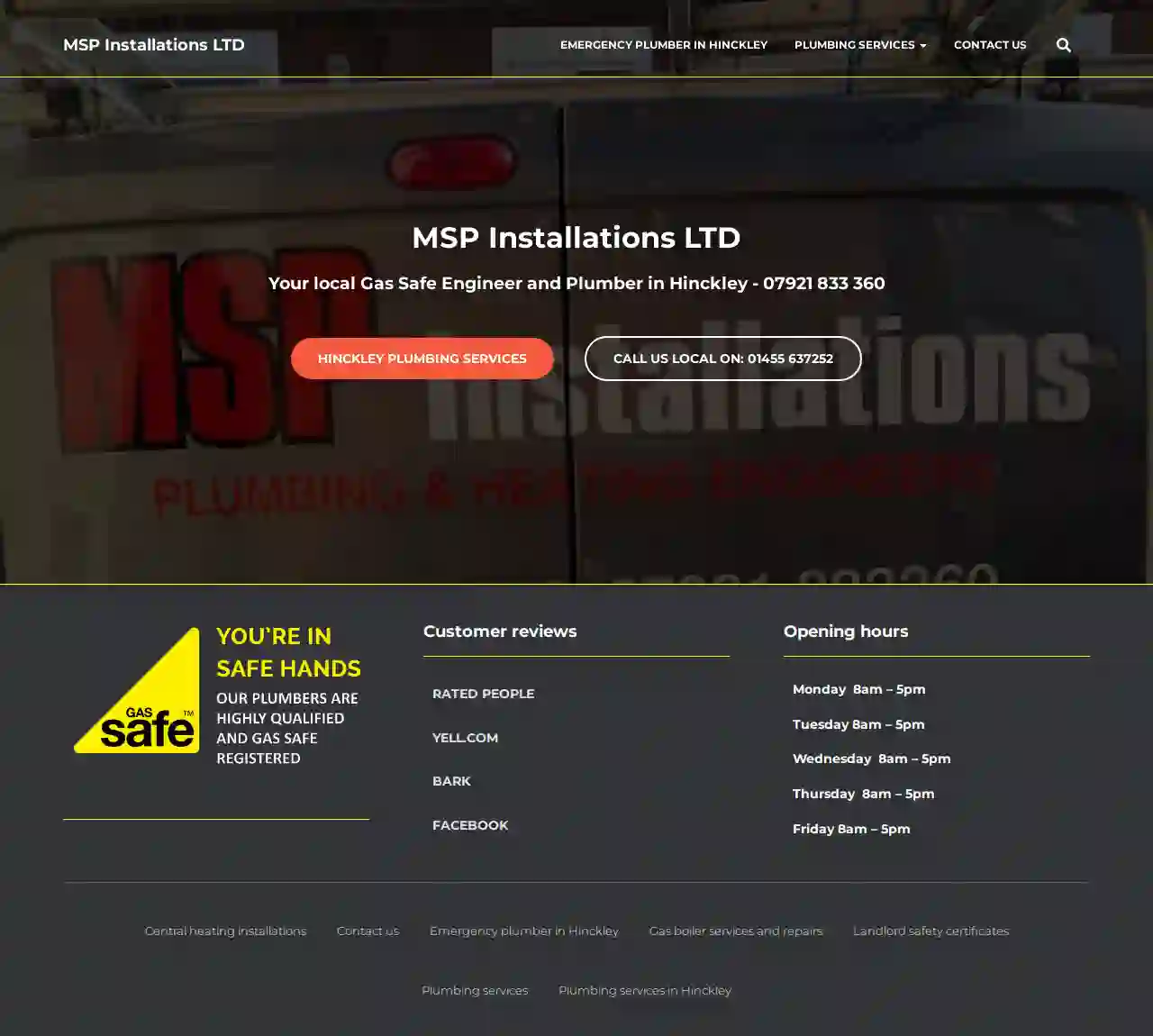
M S P Installations
511 reviewsHinckley, Unit 1, 14-16 Coventry Road, LE10 1XN, GBMSP Installations LTD is a local business providing emergency plumber services in Hinckley. We offer a range of plumbing services, including gas boiler services and repairs, landlord safety certificates, and central heating installations. Our team of experienced plumbers is dedicated to providing top-notch services to our customers. With a strong reputation in the community, we are proud to be your local Gas Safe Engineer and Plumber in Hinckley. Contact us today to schedule an appointment or learn more about our services.
- Services
- Why Us?
- Gallery
Get Quote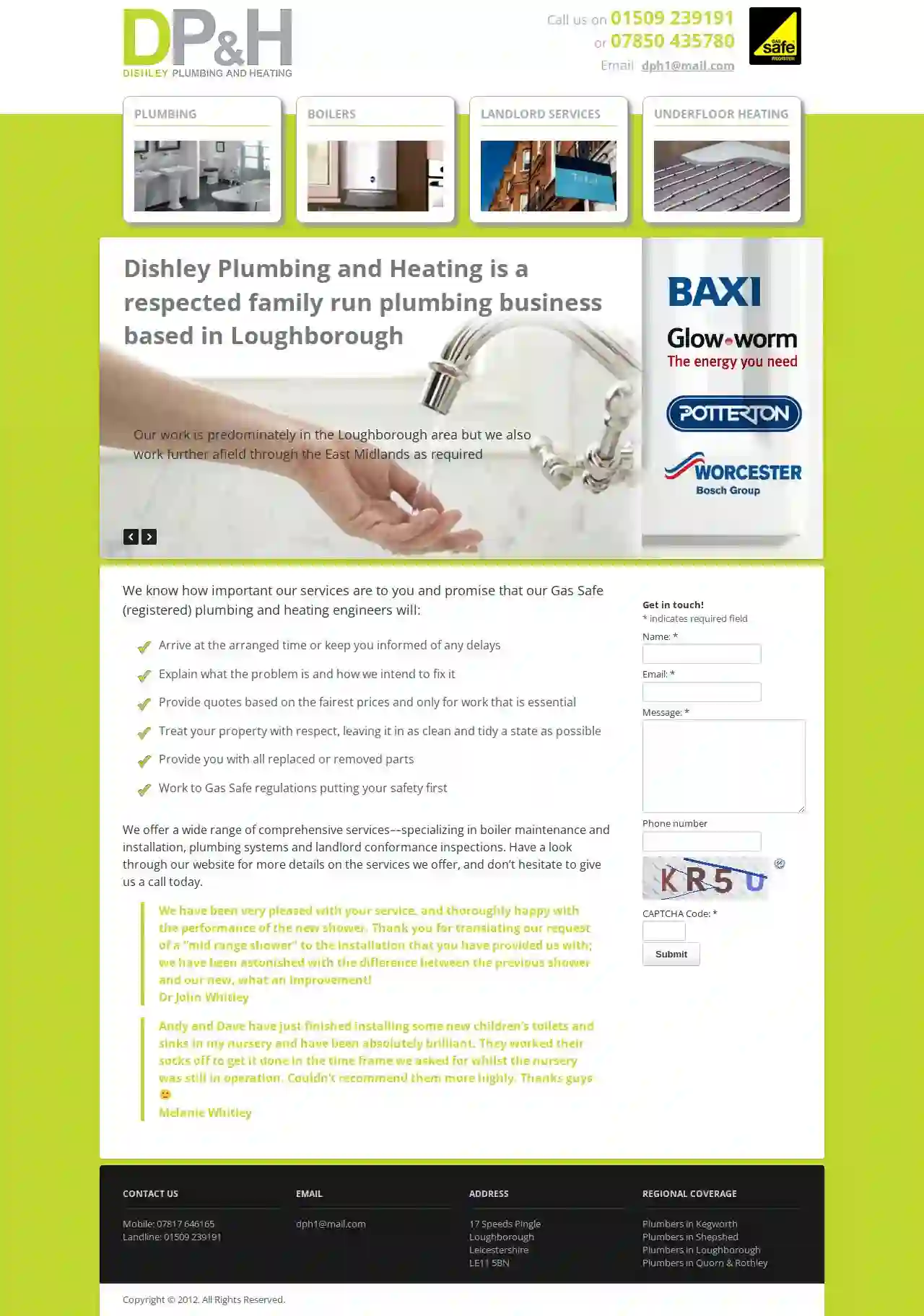
Dishley Plumbing & Heating Ltd
3.73 reviews17 Speeds Pingle, Loughborough, LE11 5BN, GBDishley Plumbing and Heating is a respected family run plumbing business based in Loughborough. Our work is predominately in the Loughborough area but we also work further afield through the East Midlands as required. We know how important our services are to you and promise that our Gas Safe (registered) plumbing and heating engineers will: Arrive at the arranged time or keep you informed of any delays Explain what the problem is and how we intend to fix it Provide quotes based on the fairest prices and only for work that is essential Treat your property with respect, leaving it in as clean and tidy a state as possible Provide you with all replaced or removed parts Work to Gas Safe regulations putting your safety first We offer a wide range of comprehensive services––specializing in boiler maintenance and installation, plumbing systems and landlord conformance inspections. Have a look through our website for more details on the services we offer, and don’t hesitate to give us a call today.
- Services
- Why Us?
- Our Team
- Testimonials
- Gallery
Get Quote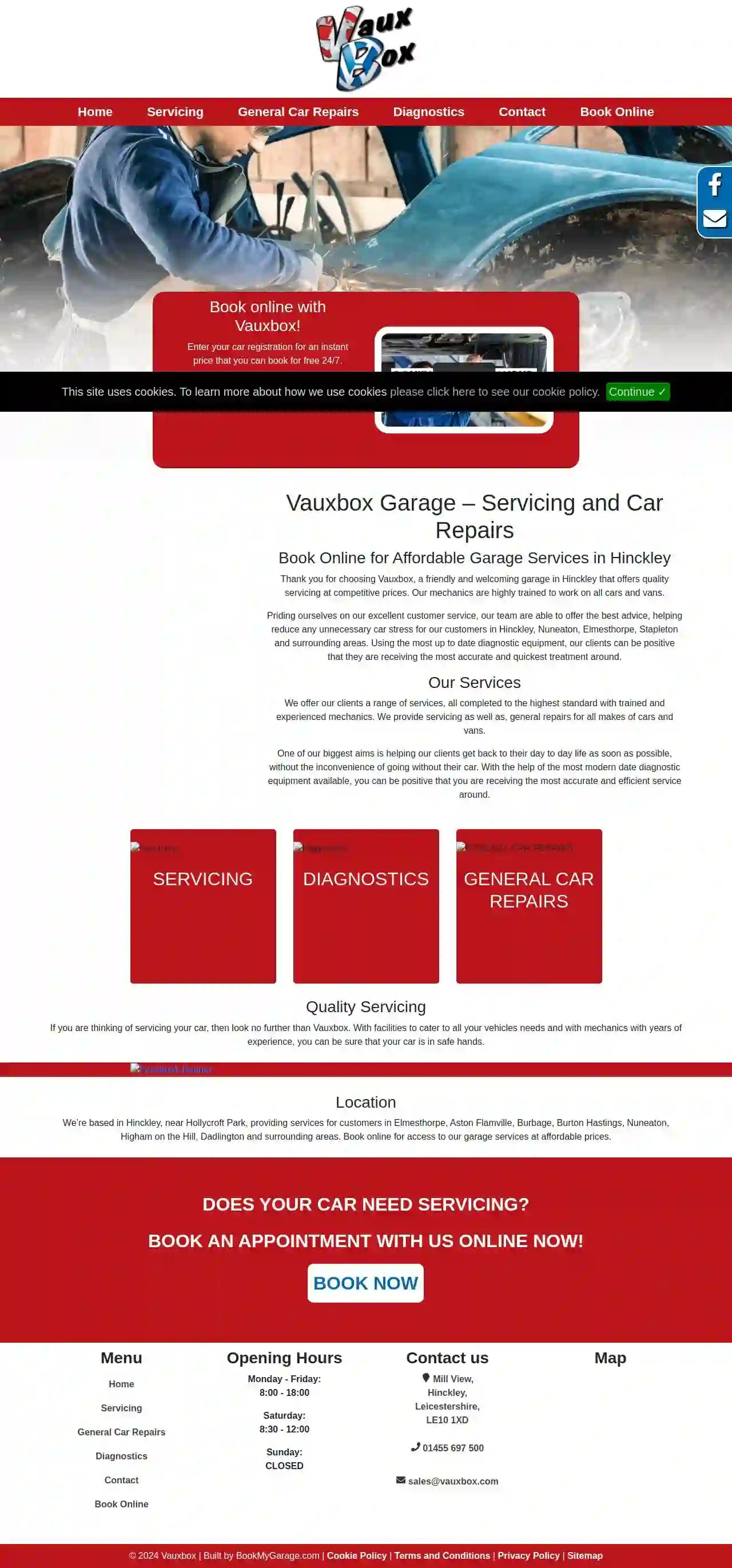
VauxBox
4.9120 reviewsMill View, Hinckley, LE10 1XD, GBVauxbox Garage – Servicing and Car Repairs is a friendly and welcoming garage in Hinckley, offering quality servicing at competitive prices. Our mechanics are highly trained to work on all cars and vans. We pride ourselves on our excellent customer service, our team are able to offer the best advice, helping reduce any unnecessary car stress for our customers in Hinckley, Nuneaton, Elmesthorpe, Stapleton and surrounding areas. Using the most up to date diagnostic equipment, our clients can be positive that they are receiving the most accurate and quickest treatment around. We offer our clients a range of services, all completed to the highest standard with trained and experienced mechanics. We provide servicing as well as, general repairs for all makes of cars and vans. One of our biggest aims is helping our clients get back to their day to day life as soon as possible, without the inconvenience of going without their car. With the help of the most modern date diagnostic equipment available, you can be positive that you are receiving the most accurate and efficient service around.
- Services
- Why Us?
- Gallery
Get Quote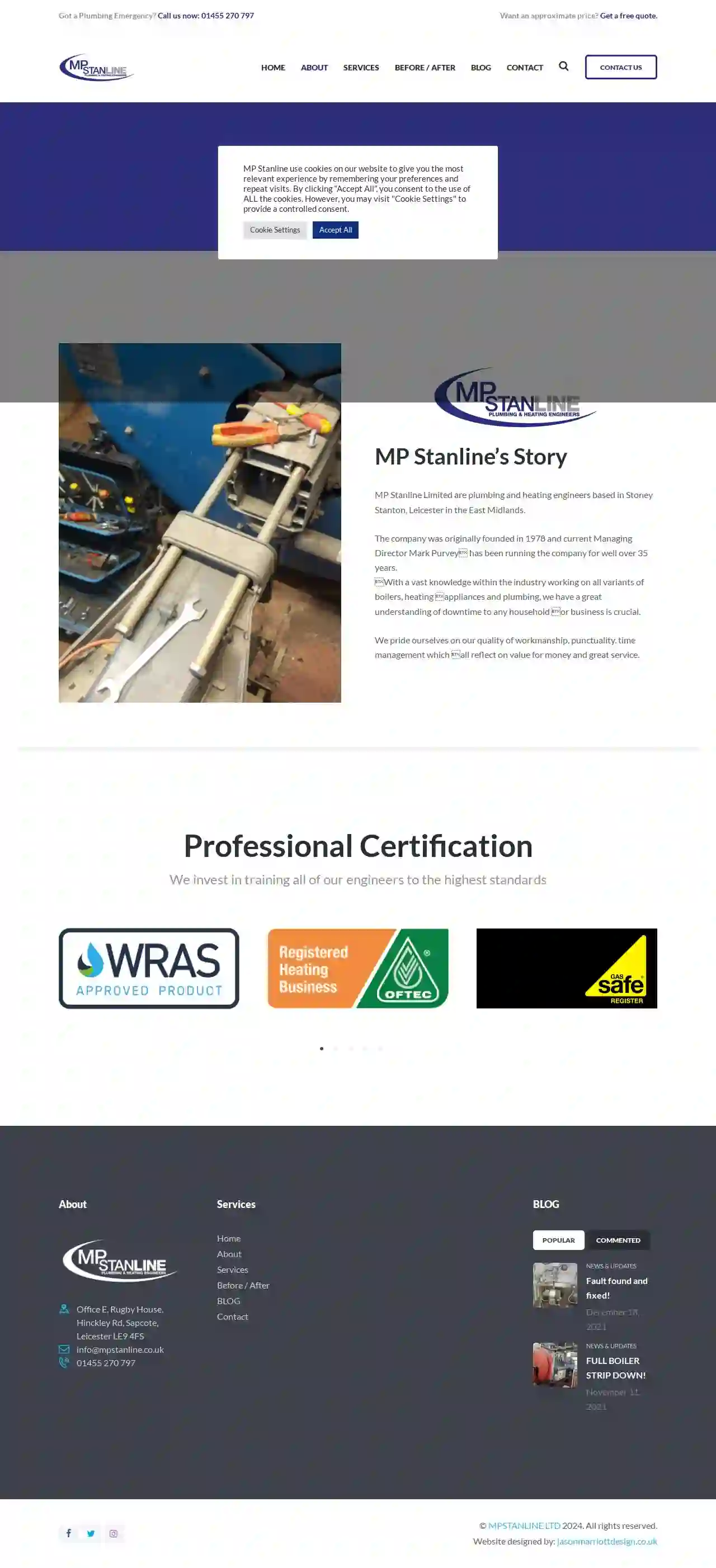
M P Stanline Ltd
32 reviewsOffice E, Rugby House, Hinckley Rd, Sapcote, Leicester, GBMP Stanline Limited are plumbing and heating engineers based in Stoney Stanton, Leicester in the East Midlands. The company was originally founded in 1978 and current Managing Director Mark Purvey has been running the company for well over 35 years. With a vast knowledge within the industry working on all variants of boilers, heating appliances and plumbing, we have a great understanding of downtime to any household or business is crucial. We pride ourselves on our quality of workmanship, punctuality, time management which all reflect on value for money and great service. Professional Certification We invest in training all of our engineers to the highest standards.
- Services
- Why Us?
- Our Team
- Gallery
Get Quote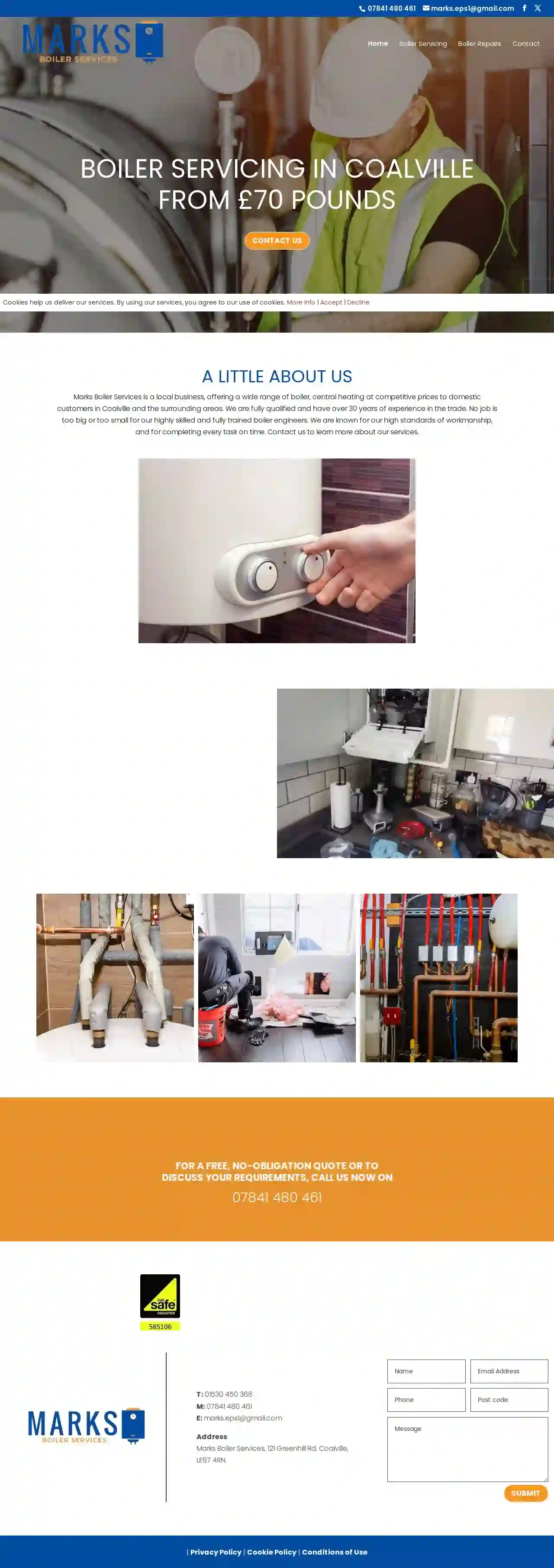
Mark's Boiler Services
4.728 reviews121 Greenhill Road, Coalville, LE67 4RN, GBMarks Boiler Services is a local business, offering a wide range of boiler and central heating services at competitive prices to domestic customers in Coalville and the surrounding areas. We are fully qualified and have over 30 years of experience in the trade. No job is too big or too small for our highly skilled and fully trained boiler engineers. We are known for our high standards of workmanship, and for completing every task on time. From servicing and repairs to cleaning and maintenance, we offer a wide range of boiler services. Reasons to choose us: TrustMark accredited Gas Safe registered Accredited gas and LPG boiler installers Landlords Gas Safety Inspection CP12 accredited (585106) Over 30 years of experience
- Services
- Why Us?
- Accreditations
- Gallery
Get Quote
A P P M Contracts Ltd
305 Ashby Road, Coalville, LE67 3LH, GBAPPM has rapidly built an outstanding reputation for delivering quality solutions for a wide range of clients and customers. We pride ourselves on being open and transparent at all stages of engagement. It’s an approach that clients admire, which typically evolves into a long-standing business relationship.
- Services
- Why Us?
- Gallery
Get Quote
Over 12,692+ HVAC Businesses onboarded
Our HVAC experts operate in Sapcote and beyond!
HVACCompaniesHub has curated and vetted Top HVAC Businesses in Sapcote. Find a top & reliable business today.
Frequently Asked Questions About HVAC Companies
- Age: Furnaces typically last 15-20 years. If yours is significantly older, replacement is often the better overall choice.
- Frequency and Cost of Repairs: If you've been having frequent or expensive repairs, replacing the furnace might be more cost-effective in the long run.
- Energy Efficiency: Newer furnaces are significantly more energy-efficient, which can lead to lower energy bills.
- Safety Concerns: Older furnaces can pose safety risks, such as carbon monoxide leaks. A new furnace offers enhanced safety features.
- Check Online Reviews: Look for HVAC companies with positive reviews and high ratings on platforms like Google, Yelp, and others.
- Ask for Referrals: Reach out to friends, family, neighbors, or colleagues for recommendations.
- Verify Licensing and Insurance: Ensure the company is properly licensed and insured to operate in your area.
- Look for Certifications: Check for certifications from reputable organizations like NATE (North American Technician Excellence).
- Compare Quotes: Get quotes from multiple HVAC companies to compare pricing and services.
- Use a Directory like HVACCompaniesHub: Simplify your search by using our directory of pre-screened and qualified HVAC professionals.
Should I repair or replace my old furnace?
How do I find a good HVAC company near me?
Finding a reputable HVAC company requires research. Consider these tips:
What is the difference between an AC unit and a heat pump?
What are the benefits of a programmable thermostat?
Should I repair or replace my old furnace?
- Age: Furnaces typically last 15-20 years. If yours is significantly older, replacement is often the better long-term choice.
- Frequency and Cost of Repairs: If you've been having frequent or expensive repairs, replacing the furnace might be more cost-effective in the long run.
- Energy Efficiency: Newer furnaces are significantly more energy-efficient, which can lead to lower energy bills.
- Safety Concerns: Older furnaces might have safety issues, such as carbon monoxide leaks. A new furnace offers enhanced safety features.
How do I find a good HVAC company near me?
Finding a reputable HVAC company requires research. Consider these tips:
- Check Online Reviews: Look for HVAC companies with positive reviews and high ratings on platforms like Google, Yelp, and others.
- Ask for Referrals: Reach out to friends, family, neighbors, or colleagues for recommendations.
- Verify Licensing and Insurance: Ensure the company is properly licensed and insured to operate in your area.
- Look for Certifications: Check for certifications from reputable organizations like NATE (North American Technician Excellence).
- Compare Quotes: Get quotes from multiple HVAC companies to compare pricing and services.
- Use a Directory like HVACCompaniesHub: Simplify your search by using our directory of pre-screened and qualified HVAC professionals.